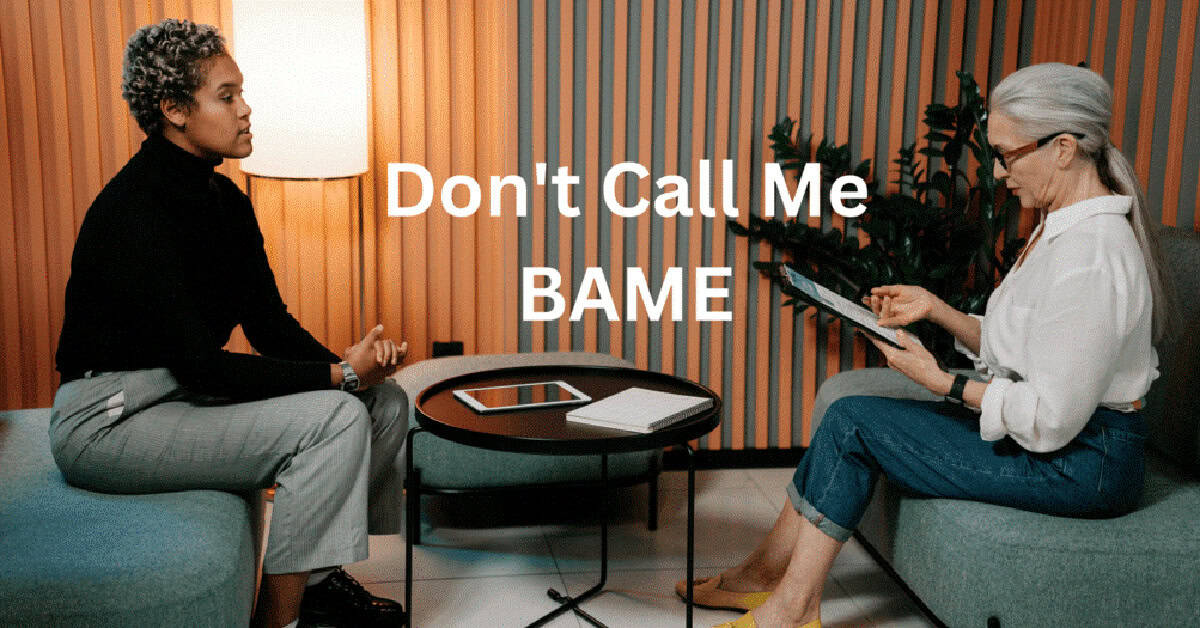The term “BAME” (Black, Asian, and Minority Ethnic) has been widely used in the UK, especially in government and corporate spaces.

However, many people, including those from Black communities, are now pushing back against it. But why is that? Let’s explore the reasons and include a perspective that’s often overlooked—those from the Caribbean.
It’s Too Broad
One major issue with “BAME” is its sweeping generalisation. Imagine grouping Black Caribbean, Black African, South Asian, East Asian, and many others under one label. It might seem convenient, but it oversimplifies the unique stories, cultures, and struggles of these communities.
For example, someone from a Caribbean background may face challenges tied to post-colonial migration and generational identity.
These issues differ significantly from those faced by other groups. When the term doesn’t allow space for these differences, it feels like it misses the mark.
It Erases Black and Caribbean Voices
Another problem with “BAME” is how it often sidelines Black communities, especially those with Caribbean roots.
Caribbean people have distinct histories shaped by colonisation, slavery, and migration. In the UK, for example, the Windrush Generation played a pivotal role in rebuilding the nation after World War II.
Despite this, their contributions—and the injustices they’ve faced, like the Windrush scandal—are frequently overlooked. By using a broad term like “BAME,” we risk diluting these specific narratives.
It Feels Impersonal
Let’s be real—”BAME” doesn’t feel like it was created by the people it’s meant to represent. For many, especially those from smaller or under-represented groups like Caribbeans, the term feels bureaucratic and detached. It’s one thing to be categorised on a form; it’s another to feel like your identity is reduced to an acronym.
It Reinforces ‘Otherness’
The term also perpetuates a subtle form of exclusion. By grouping all non-white people together, “BAME” centres whiteness as the norm. For Caribbean communities, who often navigate a dual identity as both British and Caribbean, this framing can feel particularly alienating. They’re not just “othered” in Britain but are often overlooked within broader Black or BAME discussions.
People Want More Specificity
There’s a growing call for more accurate and respectful language. Caribbean individuals often want to be named and recognised specifically, rather than being grouped into categories that don’t reflect their heritage.
Using phrases like “Black and Caribbean communities” or “Black and Asian communities” ensures no one is erased. It’s about saying what you mean and meaning what you say.
A Caribbean Perspective: Why Language Matters
Caribbean voices bring an important dimension to this conversation. The Caribbean experience is deeply tied to resilience, culture, and identity.
Generations have faced systemic barriers in areas like education, housing, and employment while also dealing with the lingering impacts of colonialism.
In the UK, Caribbean communities have often led the fight for racial equality, from the Brixton Uprising to present-day activism. Yet, these contributions are often overshadowed by the homogenising effect of terms like “BAME.”
For many Caribbeans, rejecting “BAME” is also about reclaiming identity. They want to celebrate their heritage and advocate for issues specific to their community, such as addressing disparities in health or the high rates of school exclusions among Black Caribbean boys.
What Are the Alternatives?
As people turn away from “BAME,” several options are being discussed:
- “Global Majority”: This term reframes the narrative, highlighting that people of colour make up the majority of the world’s population.
- Ethnic Minority: While still common, this term has its critics for centering whiteness and reinforcing marginality.
- Be Specific: Sometimes, the simplest solution is best. Instead of saying “BAME,” explicitly name the groups you’re referring to—whether Caribbean, Asian, African, or another identity.
Why This Matters
This debate is bigger than just one word. It’s about dignity, recognition, and fairness. Words carry weight—they shape how people see themselves and how society sees them. For Caribbean communities, rejecting “BAME” is part of a broader movement to celebrate their identity and fight for their place in the conversation.
By moving beyond terms that blur differences, we can have more honest, impactful discussions about race, heritage, and equality. And when we choose words that reflect people’s experiences, we move one step closer to truly valuing everyone.
Share on Social Media
SOCIAL MEDIA

🔥 SOLD OUT 🔥
Tonight’s Windrush Legacy Gala: Fashion Show & Exhibition – Inspiring Generations is at FULL capacity!
🎟️ No tickets on the door – please don’t travel without one.
❤️💜💛 Huge thanks to everyone who got their tickets – we can’t wait to celebrate with you tonight!
... See MoreSee Less
3 CommentsComment on Facebook
blackwallst.media/a-conversation-with-mayor-margaret-greer/
"In a powerful conversation, Mayor Margaret Greer reflects on her journey, speaking candidly about leadership, identity, resilience, and what it truly means to serve community with grace and purpose.
This is a story of representation, legacy, and what happens when humility meets responsibility - read the full article below.... and share your thoughts"
... See MoreSee Less

A Conversation with Mayor Margaret Greer - Black Wall St Media
blackwallst.media
A Conversation with Mayor Margaret Greer - In this powerful conversation, Mayor Margaret Greer reflects on her journey from a young girl in Hackney facing racial slurs, to becoming the first Black wom...0 CommentsComment on Facebook
KEEP UPDATED


GET IN TOUCH
At Caribbean Voices for Labour, we are dedicated to amplifying the voices of the Caribbean community within the UK Labour movement. Whether you’re looking to get involved, have a question, or want to learn more about our initiatives, we’re here to help.


